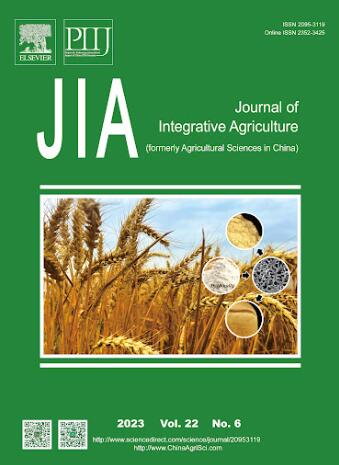在干旱胁迫条件下评估茄子野生品系1
IF 4.4
1区 农林科学
Q1 AGRICULTURE, MULTIDISCIPLINARY
引用次数: 0
摘要
由于灌溉用水越来越有限,从耐旱野生基因型中导入相关基因组区域是一种很有前景的作物育种策略。本研究评估了九个茄子引种系(IL)在水分胁迫条件下的耐旱性,这些引种系覆盖了供体野生亲本基因组的71.6%。对处于五片真叶期的植株进行为期 14 天的 100%(对照)或 30%(水分胁迫)田间灌溉,并测量其生长和生化性状。灌溉减少导致生长下降,脯氨酸和丙二醛等胁迫标志物水平升高。在这两种条件下,大多数IL的生长和生物量产量都低于栽培亲本。然而,与茎和根干重(和)相关的两个基因组区域的野生等位基因对水分胁迫的耐受性有所提高。此外,几个等位基因对干旱条件下可能提高产量的重要性状有积极影响,如叶片含水量()、水分利用效率()和叶绿素含量(和)。精细绘制耐旱基因组区域图谱并减少与影响生长区域的连锁阻力,对于通过引种育种显著提高茄子的耐旱性至关重要。本文章由计算机程序翻译,如有差异,请以英文原文为准。
Introgressed eggplant lines with the wild Solanum incanum evaluated under drought stress conditions1
As access to irrigation water becomes increasingly limited, introgression of relevant genomic regions from drought-tolerant wild genotypes is a promising breeding strategy for crop plants. In this study, nine eggplant () introgression lines (ILs) covering altogether 71.6% of the genome of the donor wild relative parent were evaluated for drought tolerance under water stress conditions. Plants at the five true leaves stage were irrigated at either 100% (control) or 30% (water stress) field capacity for 14 days, and growth and biochemical traits were measured. Reduced irrigation resulted in decreased growth and increased levels of stress markers such as proline and malondialdehyde. Most ILs had lower growth and biomass production than the cultivated parent under both conditions. However, the wild alleles for two genomic regions related to stem and root dry weight ( and ) conferred improved tolerance to water stress. In addition, several alleles had a positive effect on important traits that may improve yield under drought conditions, such as leaf water content (), water use efficiency () and chlorophyll content ( and ). Fine-mapping of the genomic regions for tolerance and reducing linkage drag with regions affecting growth will be crucial for significantly improving eggplant drought tolerance through introgression breeding.
求助全文
通过发布文献求助,成功后即可免费获取论文全文。
去求助
来源期刊

Journal of Integrative Agriculture
AGRICULTURE, MULTIDISCIPLINARY-
CiteScore
7.90
自引率
4.20%
发文量
4817
审稿时长
3-6 weeks
期刊介绍:
Journal of Integrative Agriculture publishes manuscripts in the categories of Commentary, Review, Research Article, Letter and Short Communication, focusing on the core subjects: Crop Genetics & Breeding, Germplasm Resources, Physiology, Biochemistry, Cultivation, Tillage, Plant Protection, Animal Science, Veterinary Science, Soil and Fertilization, Irrigation, Plant Nutrition, Agro-Environment & Ecology, Bio-material and Bio-energy, Food Science, Agricultural Economics and Management, Agricultural Information Science.
 求助内容:
求助内容: 应助结果提醒方式:
应助结果提醒方式:


